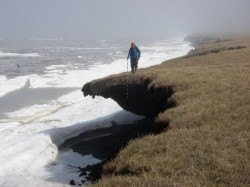NOPP to Present Poster at Coastal Society Conference
NOPP is attending the Coastal Society’s 22nd International Conference on Shifting Shorelines: Adapting to the Future in Wilmington, NC from 13-16 June 2010.

NOPP will present a poster during the reception on Tuesday, 15 June 2010 at the Coastal Society Conference. The poster is titled, Understanding the Implications of an Ice-Diminished Arctic through Collaborative Partnerships, and will highlight two FY 2007 funded NOPP Projects and the benefits of their collaborative research. Dr. Anderson’s project, Toward a Predictive Model of Arctic Coastal Retreat in a Warming Climate, Beaufort Sea, Alaska, documented the average rate of erosion observed in the study area of Drew’s Point from 2007-2009 which was approximately 15-20 m per year. The project has found a way to visually capture coastal erosion through time-lapse photography, please click to see the video.
Full understanding of the problem requires that we honor the nature of the terrestrial substrate, and both the atmosphere and oceanic climates; this absolutely requires that we cross disciplinary boundaries. – Dr. Robert Anderson
Dr. Maslowski’s project, A Comprehensive Modeling Approach Towards Understanding and Prediction of the Alaskan Coastal System Response to Changes in an Ice-diminished Arctic, combined state-of-the art regional modeling of sea ice, ocean, atmosphere and ecosystem to provide coupled models that allow a better understanding of U.S. commercial and tactical interests in the region. A regional, high resolution Arctic Climate System Model can address earlier model deficiencies and improve predictive skill of climate models at seasonal to decadal time scales.
The collaborative partnerships involved in these two highlighted projects exemplify how cutting edge science is enhanced by intersector and interagency partnerships. Dr. Maslowski stressed that climate issues cannot be addressed without interdisciplinary collaboration. NOPP is an excellent program to utilize to promote research partnerships among academia, government, industry and non-governmental organizations. NOPP projects benefit from gaining a broader national awareness of their research and from the collective skill of the partners involved.


